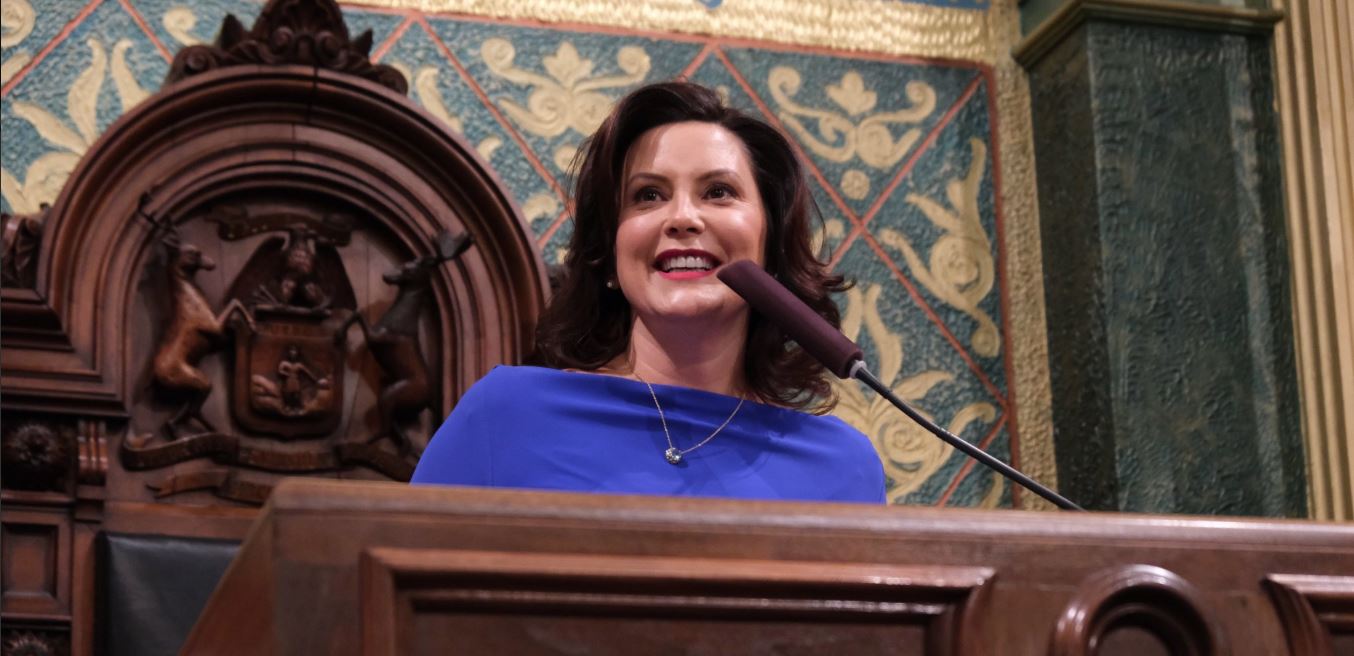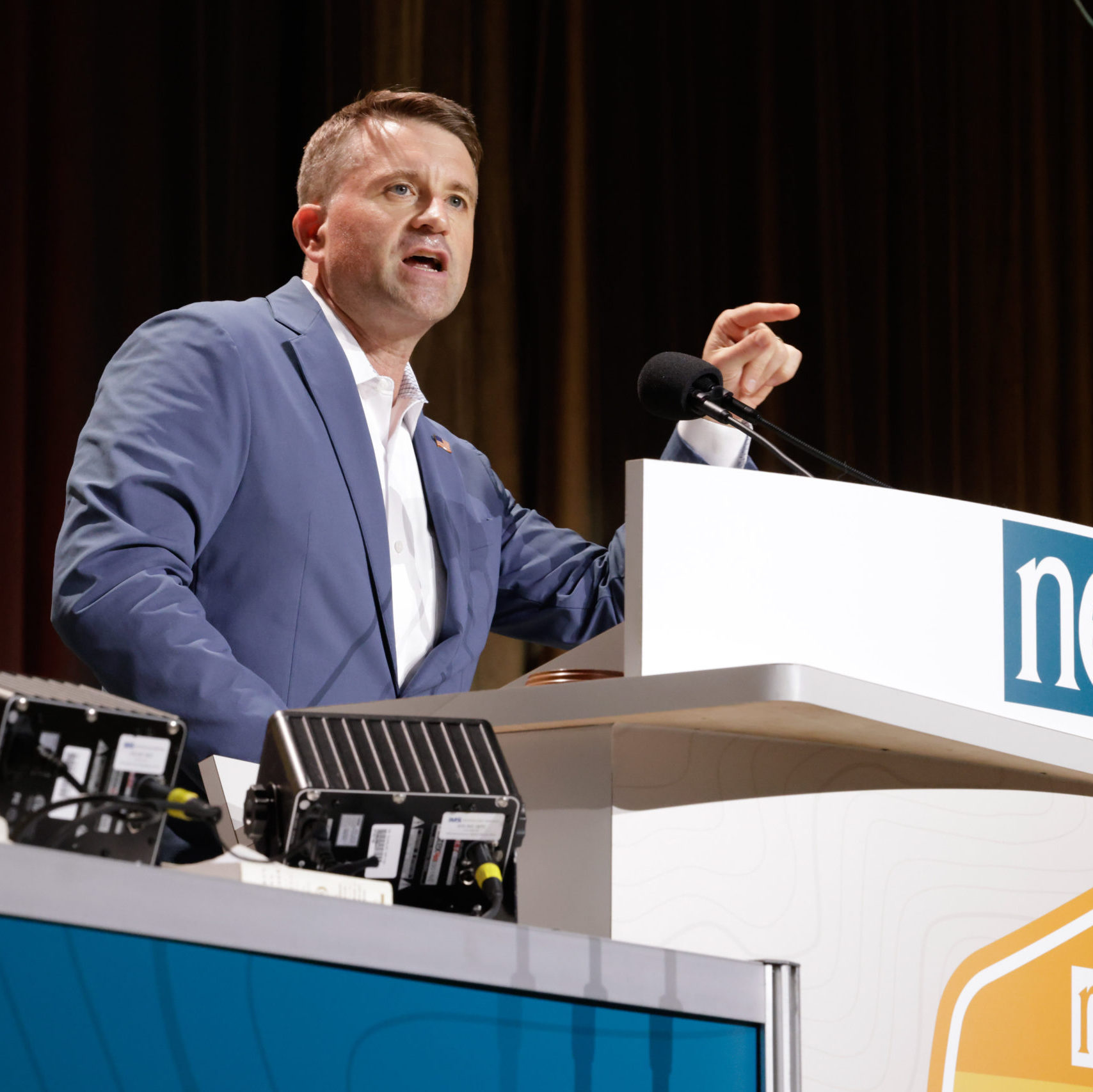Whitmer Makes Education a Priority
By Brenda Ortega
MEA Voice Editor
Gov. Gretchen Whitmer listed education funding along with fixing roads and other infrastructure as the top two priorities facing Michigan policymakers during her first State of the State address on Tuesday night.
 Everyone can see the terrible condition of the state’s roads, and the average motorist spends $562 per year in car repairs from damage related to crumbling streets and highways – a “road tax that doesn’t even fix the damn roads,” Whitmer said.
Everyone can see the terrible condition of the state’s roads, and the average motorist spends $562 per year in car repairs from damage related to crumbling streets and highways – a “road tax that doesn’t even fix the damn roads,” Whitmer said.
Less visible is the education crisis confronting Michigan, although numerous studies from a variety of sources in recent years have documented parallels between stagnant or falling student performance indicators and our state’s worst-in-nation school funding decline.
Michigan ranks dead last among all states for per-pupil school funding increases since 1994. And over the past 15 years, Michigan students have shown the least improvement in the only assessment directly comparable state-to-state, the National Assessment of Educational Progress.
“Let’s be clear,” Whitmer said. “This is not happening because Michigan kids are less talented. It’s not happening because our kids are less motivated. It’s not happening because our educators are less dedicated. It’s happening because generations of leadership have failed them.”
Whitmer pointed to repeated raids on the School Aid Fund and a 15 percent decrease in per-pupil spending over the past 25 years as examples of how multiple administrations and legislatures over the years have used K-12 education to fill gaps elsewhere in the state budget.
“I want to send a message to all of the devoted educators across Michigan: You’re not failing us. We have been failing you. Our educators deserve our support, not a funding crisis that undermines their work, weakens our schools and hurts our kids.
“We know that potential is universal, but right now opportunity is not. Our students are not broken. Our teachers are not broken. It’s our system that’s broken.”
Whitmer committed to introducing a state budget that “will give our frontline educators the tools they need to address our literacy crisis,” and she vowed to veto “anything that resembles the budget gimmicks and band-aids that have failed us in the past.”
MEA President Paula Herbart labeled Whitmer’s call to action on education funding a “welcome change” signaling the new governor’s commitment to listen to educators as dedicated professionals deserving of respect and support.
“Michigan teachers and education support professionals work every day, from pre-K through graduate school, to help every student succeed, often in tough situations,” Herbart said. “Michigan’s public schools are the cornerstone of our democracy and our economy, and I want to thank Gov. Whitmer for recognizing that our system – not our educators or our students – needs to be fixed.”
Other education announcements in the speech included a three-point plan for providing pathways to skills that lead to a good job.
Whitmer set a goal to increase the numbers of Michiganders who hold post-secondary degrees or skills certification to 60 percent by 2030 (from the current rate of 44 percent) to address a “skills gap” that threatens the state’s economic future.
“We used to think about careers in terms of ladders,” she said. “But today it’s more like rock-climbing. There are many paths to a good life, and we need to help people find the one that works for them.”
The first path Whitmer outlined targets adults who need additional training to find new in-demand careers, keep their jobs, or advance in their careers, an initiative called Michigan Reconnect.
A second path, the MI Opportunity Scholarship, will guarantee two years of debt-free community college for qualifying graduating high school students. The scholarship will launch this spring and be available for students in the fall of 2020.
“It will make Michigan the first Midwestern state to guarantee community college for all,” Whitmer said.
The MI Opportunity Scholarship also makes up the third pathway to skills by providing two years of tuition assistance at a four-year, not-for-profit college or university for students who graduate from a Michigan high school with at least a B grade-point average.
“A study last year found the average cost of tuition, fees, and room and board at a public four-year school in Michigan is almost $22,000 a year. That’s the tenth highest in the country, and it’s a complete barrier for a lot of people in our state.”
Whitmer said the budget she plans to introduce next month “will reflect my unwavering commitment to making Michigan the home for opportunity.”
And she issued an appeal for bipartisanship after acknowledging the common desire of all elected officials to ensure a positive future for our children and grandchildren.
“We all want what’s best for our communities and our state,” she said. “It’s important for us to remember that the enemy is not the person across the aisle. The enemy is apathy. The enemy is partisanship. The enemy is self-interest.”
Whitmer acknowledged that long-simmering problems will not be solved quickly or easily.
“I spent 14 years in the legislature, so I know how tough it is to keep the government funded and functioning. But I also know this: turning a blind eye or passing phony fixes won’t solve problems… Pretending that little increases can fix an education crisis. Playing a shell game with the state budget.”
Herbart agreed: “We can and must work together – across party and ideological divides – to accomplish our goals for our students and our state. To that end, MEA is proud to be part of Launch Michigan, an alliance working together across the education, business and philanthropic communities to find common ground on education policy.”
Whitmer concluded her speech by drawing on the imagery of the Mackinac Bridge and an inscription on the back of a commemorative coin from its opening more than 60 years ago: “Built by the will of a great people, upon foundations of Michigan’s faith in her future.”
“We are still a great people,” she said. “We still have the will. We still have faith. The question is: Do we have the wisdom to put partisanship aside and get the job done for the people we serve? I think we do. So let’s get to work.”
[RELATED STORY: Last week the governor spoke at the MEA Winter Conference]


